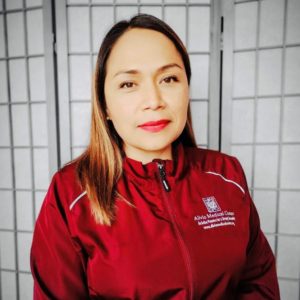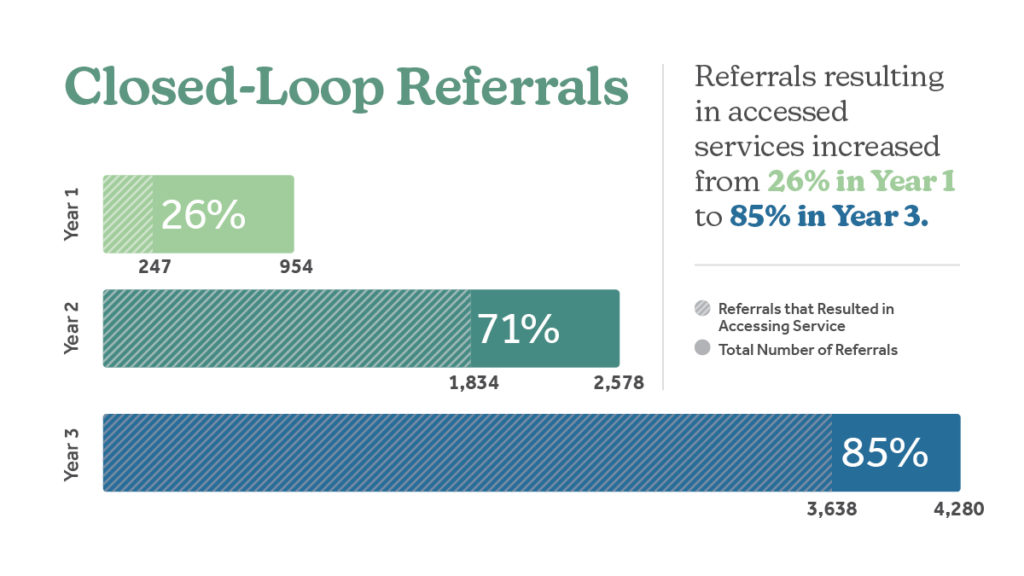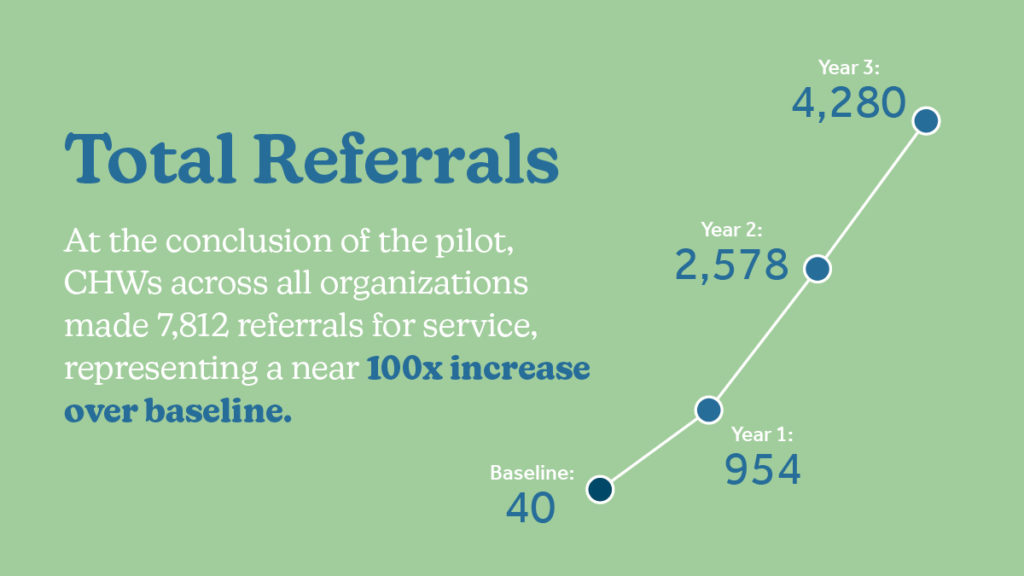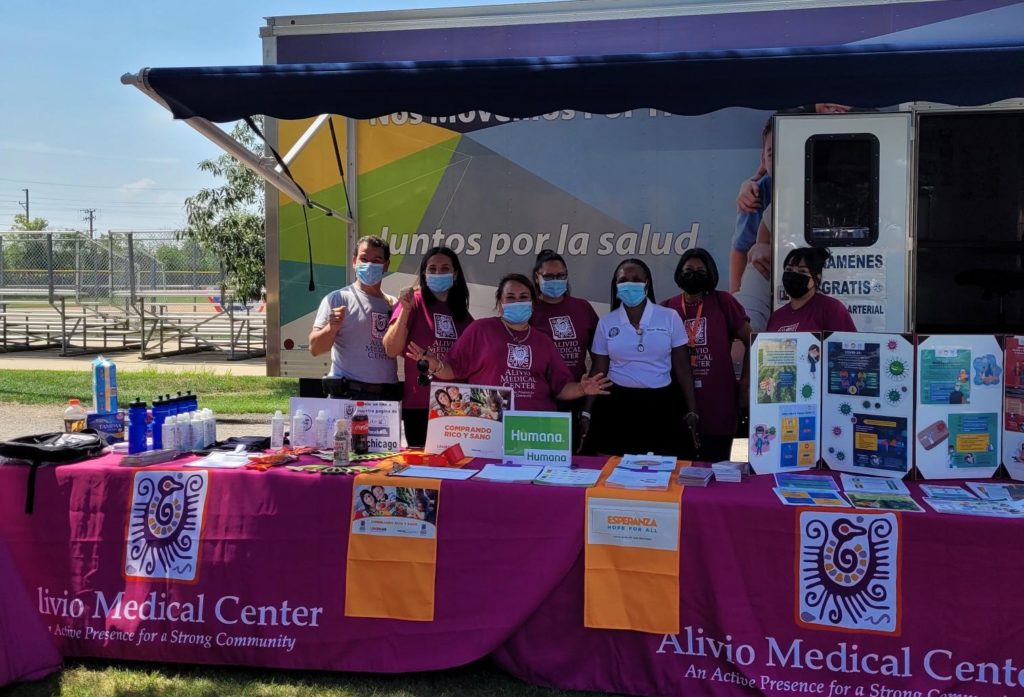
Building Toward Impact: Year 3 Learnings of Community Health Worker Pilot in Suburban Cook County
One CHW’s Story
 In her native Mexico, Yudy Galvan was a physician, and in that role, she began to cultivate her love for engaging and helping her community lead healthy lives. Yudy is a community health worker (CHW) and CHW supervisor at Alivio Medical Center, one of the original organizations in the three-year CHW Pilot focused on serving residents in the western suburbs of Chicago launched in 2018. Her work at Alivio began fifteen years ago as a CHW and she continues to coordinate health education programming for their promotoras de salud.
In her native Mexico, Yudy Galvan was a physician, and in that role, she began to cultivate her love for engaging and helping her community lead healthy lives. Yudy is a community health worker (CHW) and CHW supervisor at Alivio Medical Center, one of the original organizations in the three-year CHW Pilot focused on serving residents in the western suburbs of Chicago launched in 2018. Her work at Alivio began fifteen years ago as a CHW and she continues to coordinate health education programming for their promotoras de salud.
Since her start at Alivio, and especially within the past two years, Yudy has found that institutional barriers like health insurance, provider waitlists and the lack of culturally affirming services that address language, misinformation and fear, directly contribute to a lack of preventive care. Along with her fellow CHWs in the Pilot, she has worked to build trust and break down those challenges.
“Cuando hacemos exámenes preventivos, sobre todo en la comunidad inmigrante, hemos encontrado casos de personas que tienen viviendo más de 15 años en este pais pero que nunca han estado en contacto con un doctor o algún servicio de salud. Es ahí donde vemos la importancia de las promotoras, porque para esas personas las promotoras será el primer contacto que tengan con un servicio de salud y el comienzo para dirigirlo hacia más servicios.” [“When we carry out preventive exams, especially in the immigrant community, we have found cases of people who have lived in this country for more than 15 years and who have never been in contact with a doctor or any health service. This is where we see the importance of CHWs, because for these people CHWs will be the first contact they have with a health service and will be the start to connect them to more services.”]
Riding the Wave of Positive Momentum
Yudy’s experience is one of many in the Community Health Worker (CHW) Pilot, an initiative whose impact in the western suburbs of Chicago has gained attention at local and national levels as the role of CHWs has become widely recognized as essential during the ongoing pandemic.
Coming off a year of impressive growth in resource referrals, the CHW Pilot team expanded its national recognition and spoke at the National Association of CHWs Unity Conference in July 2021 about its unique learning collaborative and was invited by the American Public Health Association to present at their annual conference in October.
This past January, the team also organized a forum to educate nearly 400 local and national participants about the recent CHW legislation passed by the Illinois House of Representatives. The legislation authorizes CHW training, certification, and reimbursement—a tremendous win for strengthening CHW career pathways locally and charting the path forward nationally. The group, including the Illinois CHW Association and Cook County Department of Public Health, talked about how participants could continue the positive momentum and get involved. Watch a recording of the Forum and read more about the forum and legislation.
Meeting the Needs of a Diversifying Community
Demographic data released earlier this year by the Great Cities Institute at the University of Chicago at Illinois confirms an accelerated and significant Latino population growth in the western suburbs and makes evident the increased need for culturally competent care and service delivery, a cornerstone of the CHW Pilot’s strategy and purpose.
“Empezamos en Chicago y después se abrió una clínica en Berwyn y de ahí nos hemos ido expandiendo hacia los suburbios del sur y oeste. En realidad vamos a donde nos invitan porque aunque somos promotoras de Alivio en Chicago, tenemos que llevar la información [de salud] que tenemos nosotros a las personas que tienen la necesidad.” [“We started in Chicago and then opened a clinic in Berwyn and from there we have been expanding to the southern and western suburbs. Actually, we go where we are invited because although we are CHWs from Alivio in Chicago, we have to take the [health] information we have to those who need it.”]
Growth through Relationship-Building
With three years of networking, collaborative training, and relationship building, CHWs were well-positioned to maximize the quality and consistency of closed-loop referrals or referrals that secure the right resources at the right time for individuals (using digital referral tools like The HUB) to address clients’ wraparound needs. In collaboration with the Community Memorial Foundation and Healthy Communities Foundation, the Sinai Urban Health Institute evaluation team worked with Health & Medicine Policy Research Group and each Pilot organization to develop measurable goals specific to each agency. They also identified qualitative and quantitative metrics to track Year 3 objectives across all sites.
Read the full Year 3 report here.
Year 3 Objectives:
1. Increase the quality of contacts within the target service area.
In Year 3, the ratio of referrals made to referrals resulting in accessed services increased by 14% (71% v. 85%).
These results harken to the trusted role of the CHW within the community and within the larger service provider network. The metrics show that deepened client and peer relationships increase the likelihood of follow-up on referrals.

2. Increase the rate of referrals to other services.
The number of referrals made increased 66% between Year 2 and Year 3 (2,578 v. 4,280), indicating the extent of clients’ needs and the host of wraparound services to which CHWs can refer within their vast network of providers.

As the COVID pandemic persisted throughout 2020 and 2021, CHWs provided an integrated response to their communities’ health and economic challenges. Stories, like Yudy’s, emerged of the multi-dimensional aspects of the CHWs’ work and the variety of needs they support. While their goal is to assist the client in accessing the services they need at the moment, CHWs often develop a relationship and rapport with their clients, with the client disclosing other needs or returning if the need for additional support may arise. This client-centered approach positions the CHW as a trusted ally, increasing client engagement and addressing the multi-layered socio-economic needs that often affect health outcomes.

3. Increase the number of referral organizations to strengthen referral networks.
The number of referral locations nearly tripled between Year 2 and Year 3 (121 v. 351).
The nature of the CHW Learning Collaborative and each CHW’s trusted role within their community has established an extensive social service network within the western suburbs of Chicago. CHWs play a vital role within their organization by raising awareness of community needs and enhancing organizational visibility through their interconnected network. As one supervisor said, “CHWs are the voice and ears of the community.”
See the Year 3 one-page summary here!

Looking Ahead
The Pilot initiative is evolving in key ways as it builds on the successes achieved over the past three years. In addition to continuing the Learning Collaborative meetings as central to the CHW Pilot, the team plans to expand the Learning Collaborative by convening CHWs from across the western suburbs this year to network and share information about their organization’s resources, areas of expertise, and how to best leverage community assets.
If you are a CHW or CHW employer in west suburban Cook County or southeastern DuPage County interested in participating in these opportunities, please fill out this quick survey (offered in English and Spanish), and the CHW team will contact you with details.
While the voluntary CHW certification and Medicaid reimbursement processes are still in development progress at the state level, positive local momentum is happening. The Cook County Department of Public Health has recently dedicated funding to build its internal CHW staffing. This will help strengthen CHW capacity across the entirety of Cook County by replicating the successes of the Pilot’s Learning Collaborative model on a larger scale. The CHW Pilot team invites CHWs and workforce allies to connect with the statewide Illinois CHW Association (ILCHWA) to support those efforts. Learn more here.
The Community Health Worker Pilot is supported by Community Memorial Foundation and Healthy Communities Foundation. The project is coordinated by Health & Medicine Policy Research Group, with Sinai Urban Health Institute serving as trainer and evaluator.

